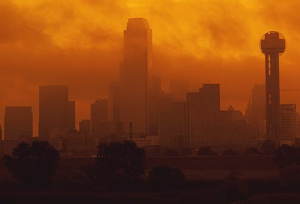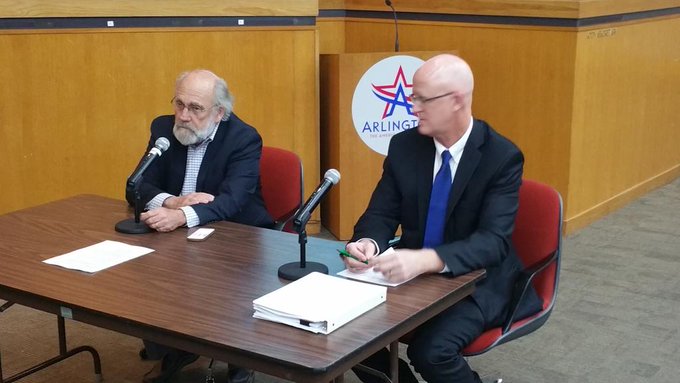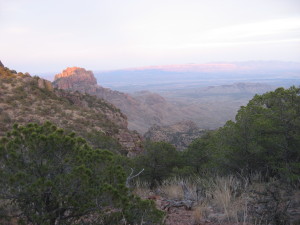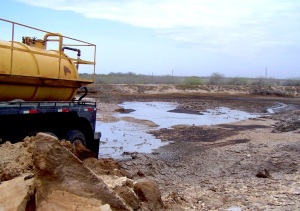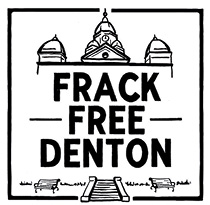City sets ambitious solar goal, path to zero carbon pollution from Austin Energy by 2030
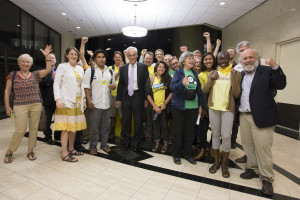
Some of the Affordable Energy Resolution community supporters celebrate with Councilman Chris Riley, who was the lead sponsor of the resolution. Photo by Al Braden.
A diverse coalition of groups representing workers, people of faith, low-income residents, clean energy supporters and environmental advocates united in their of goal of expanding affordable clean energy and protections to public health cheered the Austin City Council for adopting the Affordable Energy Resolution late Thursday evening.
The resolution comes after years of community-led work to study Austin Energy’s portfolio and generation plan, identify opportunities to strengthen the municipal utility’s clean energy and climate commitments while meeting the needs of low-income communities and after community members demonstrated strong demand for more affordable clean energy and less pollution on a reasonable but aggressive timeline.
The Affordable Energy Plan calls for Austin Energy to generate more than 60 percent of its power from renewable sources by 2025 and eliminate carbon pollution from its generator fleet by 2030. It directs the utility phase out the Decker gas-fired power plant by investing in 600 megawatts of solar power, enough to power more than 100,000 homes.
“Solar is now cheaper than building a new natural gas plant. Our analysis shows that 600 megawatts of solar will save Austin Energy between $12 and $33 million per year,” said Tom “Smitty” Smith of Public Citizen, a consumer watchdog group. “We’re grateful for the strong leadership shown by Council Members Chris Riley, Mike Martinez, Kathie Tovo, Laura Morrison and Mayor Pro Tem Sheryl Cole.”
The landmark resolution also takes significant steps to expand local solar power. It doubles Austin’s local solar goal to 200 megawatts, with half of that goal reserved for distributed residential and commercial solar projects. And the resolution expands access to rooftop solar projects by including solar leasing as an option for residents and businesses and by refining Austin Energy’s innovative value of solar tariff.
“Local solar creates local jobs. The Austin solar industry already employs more than 800 people and many of those jobs are in solar installation and can’t be outsourced,” said Kaiba White of Solar Austin. “Money spent on local solar goes back into our local economy. Allowing people from all walks of life to benefit from solar is a win-win for Austin.”
A separate resolution was also passed to establish a task force to make recommendations on expanding the utility’s energy savings goal and ensuring that energy efficiency services are provided to people of all income levels. Energy efficiency is the most easily deployed, lowest-cost option for meeting energy needs and will be a critical component of meeting climate goals for the utility.
The City of Austin has long been a leader in Texas and nationally. The City announced its plans to power all city buildings and operations with Texas wind power in 2012, and earlier in 2014 Austin Energy announced a new solar power project at the lowest cost in U.S. history. In June 2014, the Austin City Council became first elected body in the nation to endorse the goals of the Clean Power Plan, the U.S. Environmental Protection Agency’s proposed plan to curb carbon pollution that drives climate disruption.
“The impacts of a rapidly changing climate are clear in Central Texas and as a progressive community we have a moral obligation to lead in reducing our carbon footprint while providing clean, affordable electricity to our people, businesses and churches,” said Reverend John Elford with the University United Methodist Church of Austin. “This resolution sets us on a path to meet both those needs.”
The Decker natural gas-fired power plant is a major contributor to smog pollution in Travis County. Replacing the plant with clean solar power will cut smog and improve air quality for the more than one million residents in the county, protecting children, seniors and people suffering from asthma and other respiratory illnesses.
“In its opposition to this resolution, Austin Energy continued the tradition of marginalizing the communities near Decker by citing money as a primary concern at the expense public health. By passing this resolution, City Council members have finally recognized that every Austinite should have the right to clean air. That this is an issue of justice and that it is an issue of equality,” said Mayte Salazar-Ordonez, a volunteer leader with Austin Beyond Coal.
As Austin Energy develops its plan to meet the goals of the Affordable Energy Resolution, building new gas- or coal-fired power plants will not be an option, representing an opportunity to move beyond traditional power plants and further tap Texas’s renewable energy potential.
The coalition will now look to secure timely retirement of the Fayette coal-fired power plant to meet the city’s carbon pollution elimination goal as well as to cut the soot, smog and mercury pollution coming from the plant that impacts local communities, farms and waterways. Nationwide, 178 coal-fired power plants have been announced for retirement as clean energy solutions like wind, solar and energy efficiency have cut air pollution, lowered costs for consumers and created jobs.
Read Full Post »
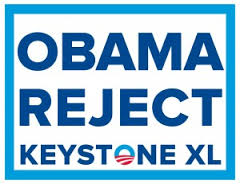 The Keystone XL pipeline would result in the release of 1.3 billion tons of climate destabilizing pollution over its expected lifespan — and that’s even before the oil gets burned overseas.
The Keystone XL pipeline would result in the release of 1.3 billion tons of climate destabilizing pollution over its expected lifespan — and that’s even before the oil gets burned overseas.

